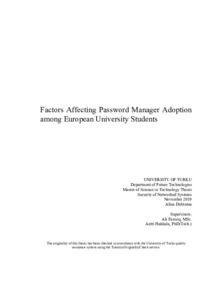Factors Affecting Password Manager Adoption among European University Students
Dubinina, Alina (2019-10-11)
Factors Affecting Password Manager Adoption among European University Students
Dubinina, Alina
(11.10.2019)
Julkaisu on tekijänoikeussäännösten alainen. Teosta voi lukea ja tulostaa henkilökohtaista käyttöä varten. Käyttö kaupallisiin tarkoituksiin on kielletty.
avoin
Julkaisun pysyvä osoite on:
https://urn.fi/URN:NBN:fi-fe2019103035990
https://urn.fi/URN:NBN:fi-fe2019103035990
Tiivistelmä
Password is the most common method of proving the identity on various online services. More and more sensitive information gets stored online: banking details, healthcare data, educational and corporate data. Due to the increasing amount of accounts, users face the challenge of creating and remembering various passwords of high complexity. To deal with such challenges and improve password management practices, security professionals suggest the use of password managers, also known as password managers. However, this tool has not gained much popularity among the end-users.
The purpose of this thesis is to identify and examine the factors that may affect the adoption of password managers. In this regard, I have proposed a research model based on the Unified Theory of Acceptance and Use of Technology (UTAUT) and Task Technology Fit (TTF) models. Data (N=265) was collected from students enrolled at one of European universities using a online survey. For this purpose, data was collected using mailing lists and Facebook page of a crowdsourcing site. PLS-SEM was used to test the proposed model with a usable data set of N= 265.analyze the data sample collected with the means of a questionnaire.
The results of the analysis show that performance expectancy and social influence affect behavioral intentions. Task technology fit, facilitating conditions, and behavioral intentions directly affect password manager adoptions, while performance expectancy, social influence, effort expectancy, and technology characteristics are the main factors that affect password manager adoption among European students indirectly.
The purpose of this thesis is to identify and examine the factors that may affect the adoption of password managers. In this regard, I have proposed a research model based on the Unified Theory of Acceptance and Use of Technology (UTAUT) and Task Technology Fit (TTF) models. Data (N=265) was collected from students enrolled at one of European universities using a online survey. For this purpose, data was collected using mailing lists and Facebook page of a crowdsourcing site. PLS-SEM was used to test the proposed model with a usable data set of N= 265.analyze the data sample collected with the means of a questionnaire.
The results of the analysis show that performance expectancy and social influence affect behavioral intentions. Task technology fit, facilitating conditions, and behavioral intentions directly affect password manager adoptions, while performance expectancy, social influence, effort expectancy, and technology characteristics are the main factors that affect password manager adoption among European students indirectly.
